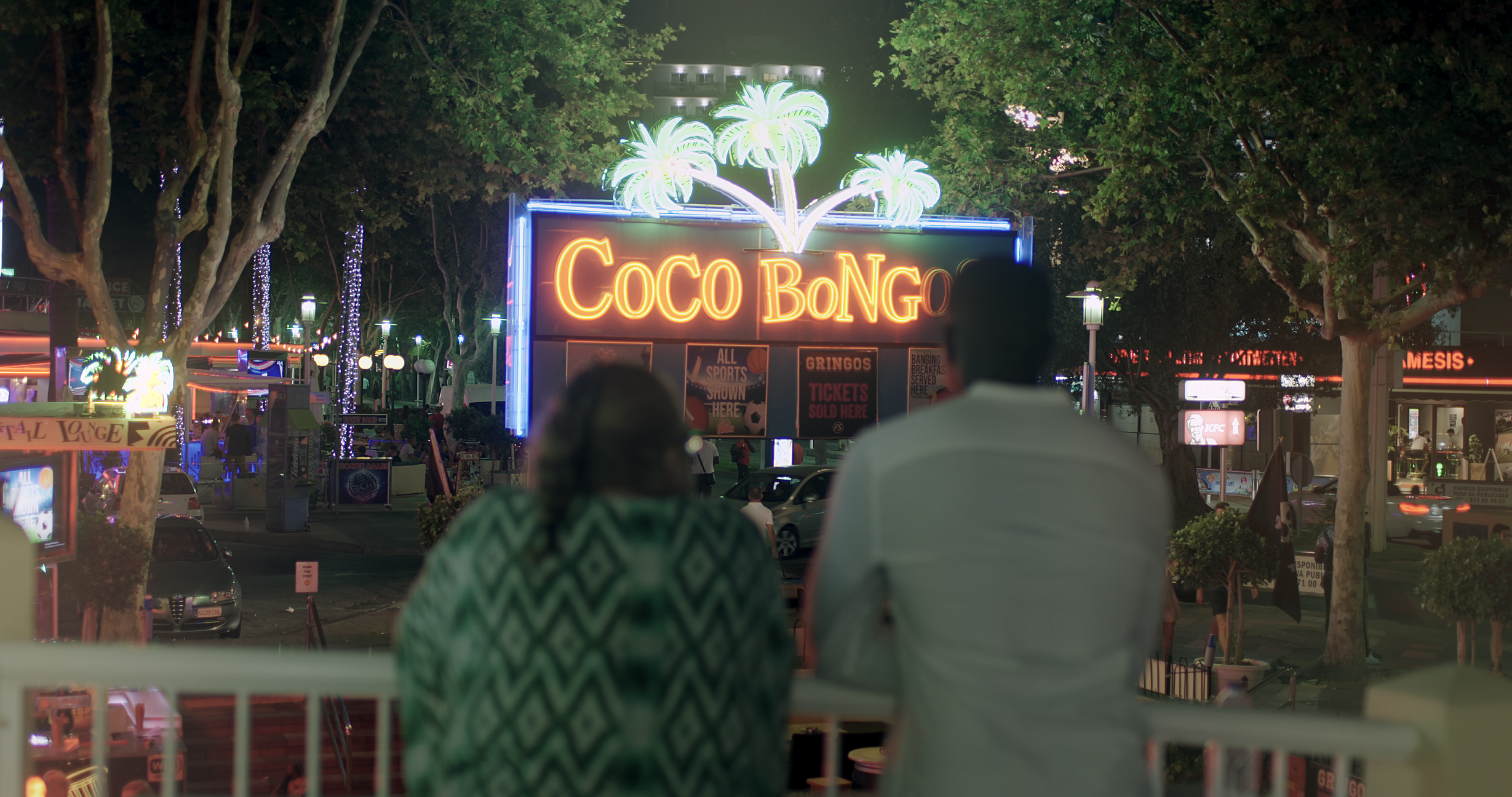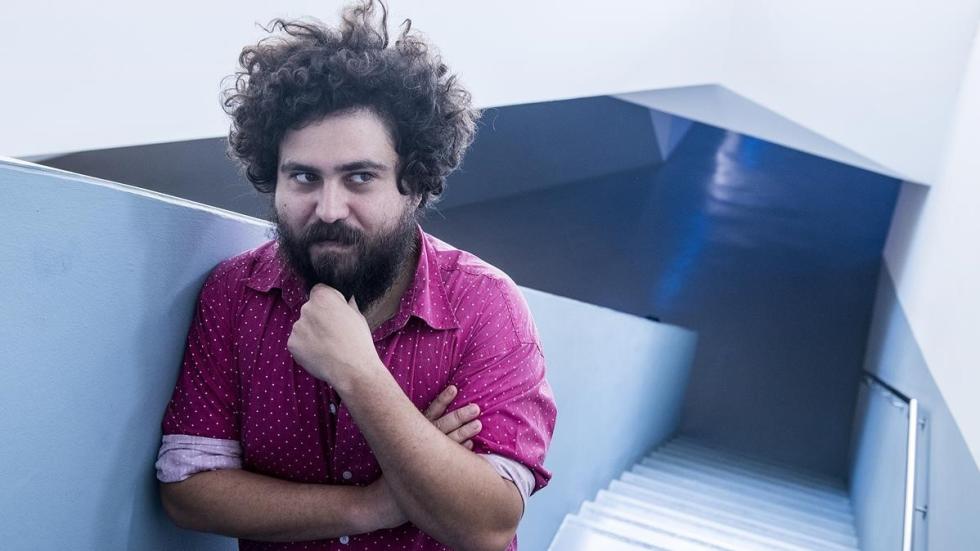The annual statistics of tourists who die trying to jump into the swimming pool from the hotel balcony, due mainly to drunkenness, are what we know of Magaluf. The summer news on the TV news, showing images of drunken tourists vomiting in the corners. You probably know Magaluf from that viral video in which a girl broke a record for giving fellatio in exchange for a shot of who knows what kind of beverage.
All that is in Magaluf Ghost Town, of course, but the new film by Miguel Ángel Blanca (Quiero lo eterno, Your Lost Memories) goes further, much further: "We went to Magaluf for what everyone else goes there for, to find out if all those legends of extreme low-cost tourism are true", admits the filmmaker.
Winner of the Best International Film Award at the Tessalonika Festival after its screening at the Hot Docs Canadian International Documentary Festival, the film now arrives at the Seville Festival's New Waves Non-Fiction Section. Magaluf Ghost Town penetrates the heart of the Balearic town, but avoids the usual sensationalism to dive into the very particular idiosyncrasies of a group of local inhabitants, constructing a portrait somewhere between humane and ironic, but with an unusual approach combining a touch of horror cinema and a bit of social chronicle.
We talked to Miguel Ángel Blanca about such an extravagant and fascinating film.

Magaluf Ghost Town, by Miguel Ángel Blanca
What did you discover in Magaluf?
"On a mythological level, what we find there is much more interesting and demanding than we imagined. Drunkenness, sex on the beach, fellatio contests and people throwing themselves off balconies turned out to be the least of it... What we discovered is that Magaluf is a magical place full of its own rules, a scenario where truth and simulacrum allow us to continue speculating realities and constructing representations of oneself which, in the end, is the main theme around which all my filmography has revolved".
The film is labelled as a documentary, I would say that there are a lot of drawbacks to that, because it is treated almost like a horror film, or a mystery film? What do you think?
"I would say that if you find a lot of BUTs it's because you have certain conflicts, frustrations and disappointments with the film and its forms, and I'm interested in that. Someone smarter than me said that the only truth that should be of interest is the one that each spectator maintains with the film, and I'm on that same boat. As for the label that should be given to Magaluf Ghost Town according to its forms, I think that, like the town of Magaluf itself, there comes a moment in our documentary when one no longer knows what is true or false. But it doesn't matter either because the film is about just that: can a tourist spot survive without building a fictional story around it? In my films, truth doesn't matter too much. In fact in life itself truth is less and less important. Documentary? Fiction? Does it really matter? Our life is already a huge lie in order to cope with reality. Absolutely everything is already representation. I recommend enjoying the film without this concern and then we could catalogue it when we have to order the DVD's in the public libraries.
How did you construct the stories? Did you start from a real base to modulate it and adjust it to what you wanted to tell?
"My way of working since Quiero lo Eterno consists of finding special people and trying to transfer to film all the fascination that they arouse in me. It was the same with Magaluf Ghost Town. The scripting process was to engage in long conversations with the protagonists, to get to know their reality in order to stage it, but also to fantasise about what they would like to BE in a film, what memories they would like to portray or what parts of themselves they would like to explore, always starting from what we call "everyday truth". There are scenes in the film that illustrate situations they told me the night before: Tomorrow I'm going to go dancing in Punta Ballena, perfect, let's film it. I feel like getting my cards dealt, good scene, we'll take care of it. I'd like to rob a drunk tourist, do you want to do it, so would we... The production design we build on the shoots and the technical and human team I work with, allows us the possibility of writing and shooting scenes quickly based on intuitions that we may have in a seemingly crazy way to generate a lot of material. Later, in the editing room, they are given coherence and verisimilitude or, quite simply, you realise that the intuition you had was a very bad idea".
Si pensamos Magaluf Ghost Town casi como una peli de terror, aparecen las ideas de ciudad fantasma, de los guiris como zombis o vampiros, y está el componente mitológico de la isla y los sacrificios que demanda...
“Sí, todo esto que dices está en el documental. Uno de las apuestas era saber equilibrar el misterio y el terror con el costumbrismo. Cómo poner a bailar el tono de extrañeza y turbación, con los lugares comunes del veraneo balear. Es de las cosas que más satisfecho estoy de Magaluf Ghost Town”.
Hay algo de la propuesta que me hacía pensar en En construcción, de José Luis Guerin, o en el díptico La leyenda del tiempo/Entre dos aguas, de Isaki Lacuesta. “Creo que Guerín y Lacuesta son directores muy importantes para toda la siguiente generación que nos divertimos con todo eso que llamaron el híbrido entre documental y ficción. Algunos de sus trabajos han sido muy inspiradores para mi, En Construcción y Los Pasos Dobles fueron grandes momentos en la sala de cine. Quizás yo no comparto con ellos el fuerte respeto que le tienen al cine. Para mi es importante faltar un poco al respeto en general, y a las formas y a los lenguajes del cine en particular. Hablo de esa idea de no tener miedo a extralimitarse, ni dar explicaciones a nadie, ni hacer ascos a nada para construir un relato. Eso lo aprendí muy fuerte cuando hicimos La Extranjera y Després de la Generació Feliç, influenciadas por cineastas como Kikol Grau, Andrés Duque o Virginia García del Pino. Esa sensación de aplastar los límites del relato es algo que también adoro de Jean Rouch, del primer Ulrich Siedl, de Joshua Oppenheimer o del escritor Agustín Fernandez-Mallo cuya obra me iluminó durante la fase de montaje de Magaluf Ghost Town hasta el punto que un día fui a robarle un abrazo… pero eso ya es otra historia, claro…”
If we think of Magaluf Ghost Town almost like a horror film, concepts of ghosts, of tourists as zombies or vampires appear, and there is the mythological component of the island and the sacrifices involved...
"Yes, all of this is in the documentary. One of the stakes was to know how to balance the mystery and terror with the genre. How to balance the tone of strangeness and disturbance with the commonplaces of the Balearic summer. That's one of the things I'm most satisfied with in Magaluf Ghost Town".
There is something about the film that made me think of En construcción, by José Luis Guerin, or the diptych La leyenda del tiempo/Entre dos aguas, by Isaki Lacuesta. "I think Guerin and Lacuesta are very important directors for the next generation of people who had fun with what they called the hybrid between documentary and fiction. Some of their work has been very inspiring for me, En Construcción and Los Pasos Dobles are great highlights in the cinema. Maybe I don't share with them the strong respect they have for cinema. For me it's important to be a little disrespectful in general, and to the forms and languages of cinema in particular. I'm talking about this idea of not being afraid to go too far, or to explain yourself to anyone, or to be afraid of anything in order to construct a story. I learnt that very clearly when we made La Extranjera and Després de la Generació Feliç, influenced by filmmakers such as Kikol Grau, Andrés Duque and Virginia García del Pino. That feeling of crushing the limits of the story is something I also adore in Jean Rouch, the first Ulrich Siedl, Joshua Oppenheimer and the writer Agustín Fernandez-Mallo, whose work enlightened me during the editing phase of Magaluf Ghost Town to the point that one day I went to steal a hug from him... but that's another story, of course...".







